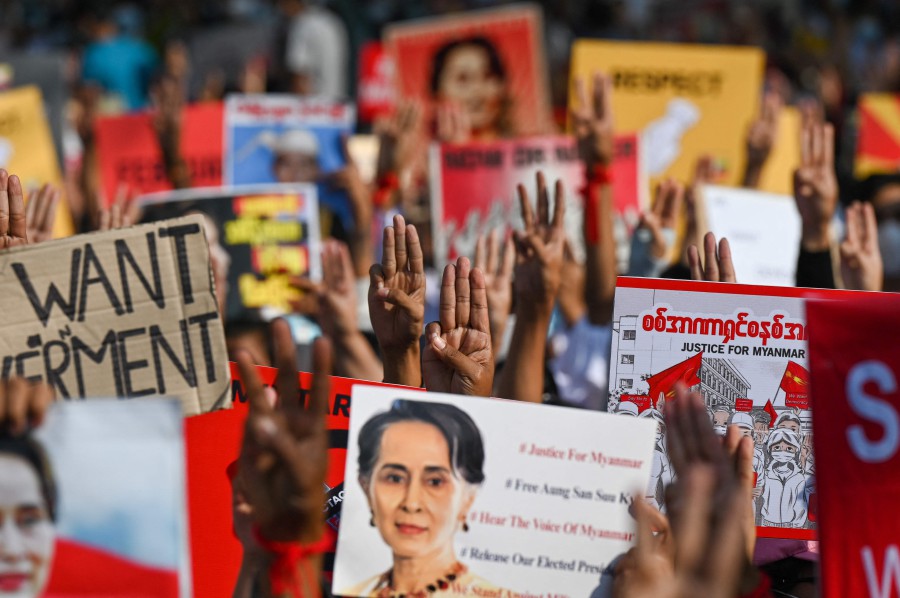MYANMAR has reverted to military rule. Claiming election fraud as a basis for the coup, the military has detained top civilian leaders of the former government, including State Counsellor Aung San Suu Kyi, who was head of government, and President Win Myint.
Many others were also arrested, including activists and s tudent protesters who brought Suu Kyi's party, the National League of Democracy (NLD), to share power with the military in a transition to democracy.
On Feb 1, all this ended when the military regime took control and announced a year-long national emergency before holding another election.
There is an outcry against the coup in Myanmar, which some prefer to call Burma despite the now widely accepted name encompassing the country's sovereignty. It is this hegemonic tendency by certain Western nations that many find offensive.
In this regard, therefore, the principle of non-interference in the domestic affairs of sovereign nations by Beijing is much appreciated, while yet bringing shared prosperity. Myanmar, especially, has had relations with the People's Republic of China for 70 years, with most of the time being under military rule. China's support has kept successive military regimes in power.
Only very recently have there been problems between Myanmar and China, when fighting in the Myanmar border spilled over into the Chinese province of Yunan. But even these have been b ro u g h t under control.
So, it was no surprise when China refused to interfere in the recent Myanmar reversion to military rule at the UN Security Council. Inasmuch as relations were good with the NLD government, the indications are that nothing will change.
China is heavily invested in Myanmar as part of its Belt and Road Initiative (BRI). In return, Myanmar will provide it access to a seaport that bypasses congestion in the Straits of Malacca, imposed or otherwise. As such, Myanmar has strategic value to China. Supporting Myanmar 's sovereignty is also important to its security.
The shared border is of immeasurable importance to China given the presence of surrounding United States bases intended to encircle her as part of the US' Asian pivot policy.
Perhaps it's plausible to believe that an army on standby is more attractive to Beijing than a civilian government propped up by the West on its borders.
Losing Myanmar as part of the Indo-Chinese buffer zone, too, is surely not a palatable option.
Vietnam is already an illogical development for China, where the US is being welcomed back even before the pervasive damage of the Vietnam War has yet to be fully repaired. Granted, a thousand years of Chinese colonialism is not easily forgiven by the Vietnamese, but the damage of intense US bombings and harrowing deformities caused by the use of Agent Orange still persist many decades after the war.
And they are even more horrifying. Hence, China's wariness of its borders. Myanmar is suffering the risks of prolonged instability. Just over a week into the military coup, protests have escalated in the country's two main cities — Yangon and Mandalay.
The police are using water cannons to disperse protesters before detaining them. The international media is more concerned about the loss of democracy in Myanmar.
But one wonders why a general can rule in Egypt and not in Myanmar? Meanwhile, reports from Bangladesh suggests that the Rohingya refugees are happy to see the end of Suu Kyi's rule. While the Dhaka Tribune article had cautioned the Rohingya against the new military rulers, however, history has shown that repatriations did happen during the military's rule.
The military has, in fact, immediately after the coup, reached out to the Rohingya in Rakhine State.
China is the only power to have offered a substantive contribution to the resolution of the Rohingya problem. It has offered to play an overseeing role in a tripartite arrangement to repatriate the Rohingyas, where China can hold to account both sides.
Such a move indicates the special relationship between China and Myanmar, irrespective of who governs.
Of course, now that China is heavily invested in Myanmar visa-visits BRI policy, debilitating political instability in its neighbour is something that it will try hard to prevent. Its refusal to act against Myanmar in the UN Security Council is a strong signal that China still has Myanmar's back.
That Russia has stood by China in this respect suggests an unwavering alliance between these two super powers. Myanmar, as a member nation of Asean, is unlikely to be under pressure from the other members.
Like China, the organisation holds dear the principle of noninterference in the domestic affairs of its members. Rather, this regional organisation exercises constructive engagement as the means to resolve any and all contradictions.
This has been the position it has always held regarding Myanmar. There was no aversion to the military junta of old and, in all likelihood, the stance will remain unchanged. Which time has shown that China is comfortable with.
While protests may be escalating at the moment, it will most likely be too reminiscent of Hong Kong and Thailand.
The writer is executive director, International Movement for a JUST World (JUST)



